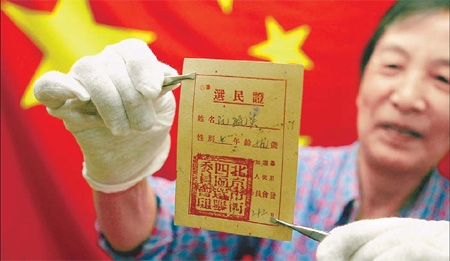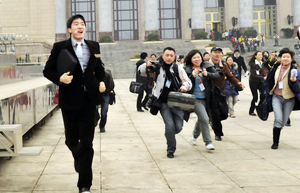Electoral change on table
By ZHU ZHE (China Daily)
Updated: 2010-03-09 07:23
|
 A woman shows the voter registration card for a 1953 Beijing local people's congress election. [Photo/Xinhua] |

Amendment will ensure equal rights to urban, rural citizens
BEIJING: China may boost representation for its vast rural population, a move expected to grant rural residents more say in deciding their own fate and the development of the country.
The National People's Congress (NPC) on Monday started discussion on a draft amendment to the Electoral Law, which, if passed, will grant equal electoral rights to urban and rural citizens.
Currently, there are about 3,000 NPC deputies, but each urban deputy represents only a quarter the number of constituents compared to a rural deputy. Before 1995, the ratio was even wider at one to eight.
It was originally intended to protect the interests of what had been a smaller urban population surrounded by hundreds of millions of farmers and ensure the leading role of the country's working class.
According to the national census in 1953, when the first version of the Electoral Law was passed, the urban population made up only about 13 percent of the country's total, and an equal ratio of rural and urban representation would have meant an excessive number of rural deputies in the top legislature.
However, with rapid urbanization and rural economic development, official figures show about 47 percent of people lived in urban areas last year and parity is expected by 2015.
"The time is right for equal representation, which is conducive to expanding democracy," Wang Zhaoguo, vice-chairman of the NPC Standing Committee, said on Monday while explaining the draft to lawmakers.
The draft amendment does not include details of how many people a NPC deputy will represent. If passed, the NPC Standing Committee is expected to decide on the specifics before the next elections take place in 2012.
Lawmakers and experts said the revision, referred to as major progress in the development of democracy, would help increase the number of farmer NPC deputies.
Farmer deputies are more familiar with the situation in the countryside and the change will help the top legislature better understand rural areas and make more scientific decisions, said Xu Anbiao, a member of the NPC Standing Committee's legislative affairs commission.
Yang Shengchuan, a NPC deputy from a village of Ziyuan county in South China's Guangxi Zhuang autonomous region, said the change is the most exciting news he has heard since the country abolished the agricultural tax.
"I'll tell my villagers about the change and ask them to cherish their rights," he said.
Chen Sixi, a NPC Standing Committee member, said the change may increase the number of farmer deputies, but it would not necessarily result in parity.
He said as the election of people's congress deputies is based on household registered population, it is possible for a rural election district to elect a non-farmer deputy, as the candidates could be business people or workers who still have their household registered in the rural areas, or even local villagers or town leaders.
"But this could be further improved in the future with the reform of China's household registration system," Chen said.
The draft amendment also stipulates that the number of grassroots deputies of farmers, workers and intellectuals should be guaranteed.
Currently, a large number of NPC deputies are government officials and entrepreneurs, leaving few seats for farmers and workers.
It also added stipulations such as "organizing more face-to-face contact between candidates and electors to allow candidates to introduce themselves and answer voters' questions".


